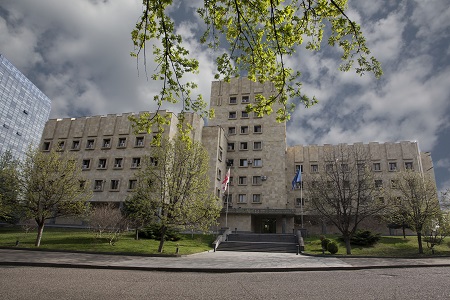Georgia’s Chief Prosecutor’s Office solves high-profile ‘photographers case’

Two former high officials have been charged with abuse of authority, violence and violation of human dignity by Georgia's Chief Prosecutor's Office, who has finished its investigation into the high-profile criminal case of four photographers who were unlawfully charged with espionage in 2011.
Today the Office announced it's investigation had revealed the four photographers were not guilty and they had been accused of espionage by the previous Government because former leaders wanted revenge after the photographers distributed pictures of how the May 26, 2011 rally was violently broken up by riot police.
Who are the ex-officials charged for the crime?
One of the two former officials allegedly responsible for the illegal imprisonment of the four photographers was David Devnozashvili, ex-deputy head of the Tbilisi Territorial Division of the Ministry of Internal Affairs' Counter-Intelligence Department.
The other person facing charges was former chief of #8 Prison Aeksandre Mukhadze.
The Prosecutor’s Office said Devnozashvili had been detained while Mukhadze would be charged in absentia. Mukhadze, currently in hiding, was also facing several other criminal charges and has been named on Interpol’s wanted list upon the request of Georgian authorities.
Meanwhile the Chief Prosecutor’s Office said its investigation was continuing to reveal other former high officials who could also been involved in the crime.
What was the motive?
Three photographers were arrested in July 2011 after they had taken and distributed pictures of the violent dispersal of May 26, 2011 rally in Tbilisi.
These photographers were:
- Giorgi Abdaladze – former photographer of Georgia’s Foreign Ministry
- Zurab Kurtsikidze – photographer for the European Pressphoto Agency
- Irakli Gedenidze – former personal photographer of then-president Mikheil Saakashvil
A fourth photographer, Irakli Gedenidze’s wife Natela Gedenidze, was also arrested.
The Chief Prosecutor’s Office said the photographs taken by the four people were disseminated in Georgia and internationally. The photos showed how the then-government used heavy-handed tactics against peaceful protesters.
These would negatively reflect the image of the then-government,” said the Chief Prosecutor’s Office today.
The organisation claimed the former government was "dissatisfied" at being portrayed in a negative light so decided to take revenge against the photographers.
Detentions
In the late night hours of July 7, 2011, law enforcement officers swarmed the homes of the four photographers and they were detained during a special operation conducted by the Counter-Intelligence Department of the Ministry of Internal Affairs.
Abdaladze, Kurtsikidze, I. Gedenidze and his wife Natela were accused of passing secret information regarding the movements of the then-president of Georgia to Russian intelligence.
The charges were immediately denied by the four but later they pleaded guilty. Today the Prosecutor’s Office said this was because of physical and psychological pressure put on the detainees.
False charges of espionage
One of the men arrested, Kurtsikidze, had been working for the European Pressphoto Agency since 2004. The agency had its Caucasus office in Moscow, Russia. Based on his contract, in return for payment, Kurtsikidze would periodically send to Moscow office his photographs as well as photographs by Abdaladze and Gedenidze, as stringers. The photographs did not contain any secret information but showed the newsworthy social and political situation in Georgia.
The legend created by law enforcers regarding the 'espionage' of Kurtsikidze, Gedenidze and Abdaladze was based on their photographic activities,” said the Chief prosecutor’s Office.
Meanwhile I. Gedenidze’s wife Natela was accused of supporting this "scheme of espionage”.
Forced confessions
I. Gedenidze and his wife Natela were the first to falsely confess their guilt.
The Chief Prosecutor’s Office said when the duo were taken to a pretrial detention centre, ex-Interior Ministry official Devnozashvili entered the room and blackmailed them. He described how hard prison conditions could be for them and forced the couple to confess their guilt.
Additionally, the Office said Devnozashvili illegally obtained a 'piquant' photo of Natela from her personal computer and threatened to publicly release this picture of they didn’t plead guilty. After this the couple falsely confessed that they were guilty of espionage.
After the false confession Natela was released but I. Gedenidze, Abdaladze and Kurtsikidze were sent to #8 Prison.
The Prosecutor’s Office said the three men were inhumanely treated in prison. A light in their cell would never turn off and the room was being permanently watched by video. The photographers were under huge psychological pressure and various illegal activities by prison staff were organised then-prison chief Mukhadze.
After eight days of inhumane treatment in prison, the three men falsely confessed to being Russia's spies.
[The photographers] were forced to learn by heart the confession text that was written in advance. They were forced to practice all night to tell the text as naturally as possible in front of a camera in the presence of their lawyers the next day,” the Prosecutor’s Office said in it's statement today.
The trio gave their false confessions but this was followed by a protest from their lawyers, who believed the false confessions had been obtained violently. The meant the photographers were forced to request a change of lawyers.
After the lawyers were changed, the three photographers signed plea agreements and were released from prison but were warned never to talk publicly about the topic.
 Tweet
Tweet  Share
Share